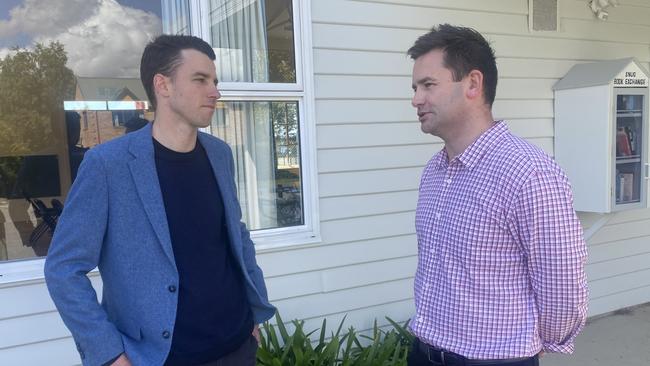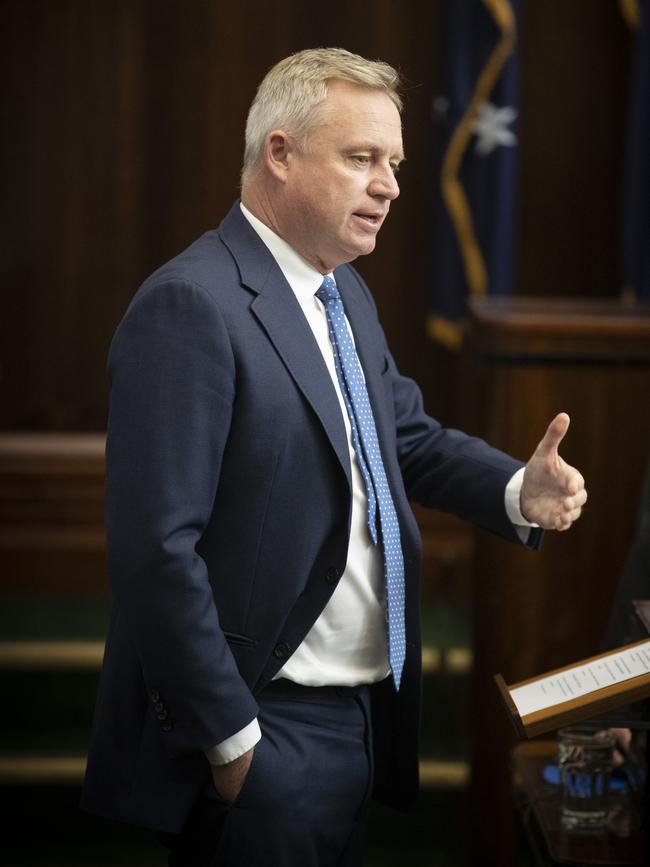Dean Winter and Kaspar Deane say the new fire tax will mean rural property owners pay more
The new fire tax could mean paying more, depending on where you live. For some, that could mean forking out thousands more. How it could work.

Tasmania
Don't miss out on the headlines from Tasmania. Followed categories will be added to My News.
A Kingborough councillor says proposed changes to Tasmania’s fire levy could leave property owners in regional areas paying thousands of dollars more every year, meanwhile Labor’s questioned the timing of increasing the levy during a cost of living crisis.
Currently, councils collect the fire levy on behalf of the state government, which is charged based on where a property is located.
Now the state government is considering two different models for a new fire levy.
Under the first scheme proposed, all Tasmanians would pay the same rate, no matter where they live in the state, but the rate would vary depending on how the land is zoned.
Under the second option, a two-tiered system would be implemented, and the rate would vary, depending on whether the property was in an urban or a regional area. After that distinction, the rate would also vary depending on zoning.

“The modelling LGAT (Local Government Association of Tasmania) has done on Kingborough has pointed out if you’re currently paying $2,500 as part of this levy now (commercial properties), you’re going to be paying $34,000 going forward as part of this fire tax,” Kingborough councillor Kaspar Deane said.
“I fully agree we need to fund the fire services adequately, but I wonder why this wasn’t already allocated previously as part of the budget if it is so important.”
Mr Deane said it was disappointing councils had not be included in the discussion so far.
“It does concern me the government is relying more on local councils to collect taxes on its behalf, especially given the fact we weren’t consulted,” he said.

Labor member for Franklin Dean Winter said the cost of living was already high enough for Tasmanians.
“This is not the right time,” he said.
“Tasmanians would all agree we need to have a fire service which is well resourced … but we need to understand very clearly how much more money they need.
Mr Winter said if the second model was adopted, property owners in areas like Snug would be hardest hit.
“We’ve seen through the modelling that industrial and agricultural zoned land are the hardest impacted, places like Snug, Electrona and Margate have a large amount of industrial land and farm land,” he said.
Premier Jeremy Rockliff said no decisions had been made yet.
“When it comes to supporting our state emergency service to ensure when the bushfires come, when the floods come … we need the very best equipment and we need personnel to save lives in Tasmania,” he said.
“That’s why we’re consulting now on the legislation, listening to people’s views … we encourage councils to provide their feedback.
“We have an inequitable system now, we need a fairer system.
‘Absolutely hammered’: ‘Fire tax’ puts heat on government
October 19, 1:20pm
Premier Jeremy Rockliff has made the case for an overhaul of how Tasmanian households pay to fund emergency services, amid a Labor attack over an increased “fire tax”.
The government’s draft Tasmania Fire and Emergency Services Bill 2023 aims to simplify “complex and restrictive” funding arrangements.
Currently Tasmanians pay for emergency services through three different levies.
The amount paid varies significantly between regions.
Under proposed changes, a single rate will be set across Tasmania, or there will be a two-tiered rate depending on whether you live in a rural or urban area.
In state parliament on Thursday, Labor leader Rebecca White said many Tasmanian households and businesses would face more cost of living pain under the plan.

“Tasmanian families are being absolutely hammered by the soaring cost of living, the last thing they need is a massive tax increase,” Ms White said.
Labor drew attention to a media release from Huon Valley Council showing the average levy increases under the proposed changes.
The council said residential property owners in the region would pay up to $150 more on average a year.
Industrial sites would pay up to $1800 more and commercial sites up to $1119 more.
Councils will be responsible for collecting the funds.
Mr Rockliff labelled Labor “policy cowards” for failing to offer an alternative.
“We are very mindful of the fact there have been two or three reviews recommending reform in this area,” he said.
“We expect more bushfires, more floods, climate change impacts are well and truly being felt here in Tasmania. It would be impossible for a government, that has had reviews on the table pointing to the need for reform, not to act. So we are acting in the best interests of Tasmania and in the interests of saving lives.
“This is the first time a government has acted on known financial issues our emergency services experience and proposed a solution.”
Minister for Police, Fire and Emergency Management Felix Ellis said the current financial model was failing.
“What our emergency services need is sustainable funding to save lives. They need new vehicles, modern tools, state-of-the-art stations, facilities for females, uniforms and training,” Mr Ellis said.
“We need to ensure community preparedness – community programs, school education, a nation-leading fuel reduction program, flood modelling and flood levees. We cannot keep the status quo and the Rockliff Liberal Government will always back our fire fighters and emergency services 100 per cent. “
The options paper for the funding model for Tasmania Fire and Emergency Service is open for public comment until November 5.


